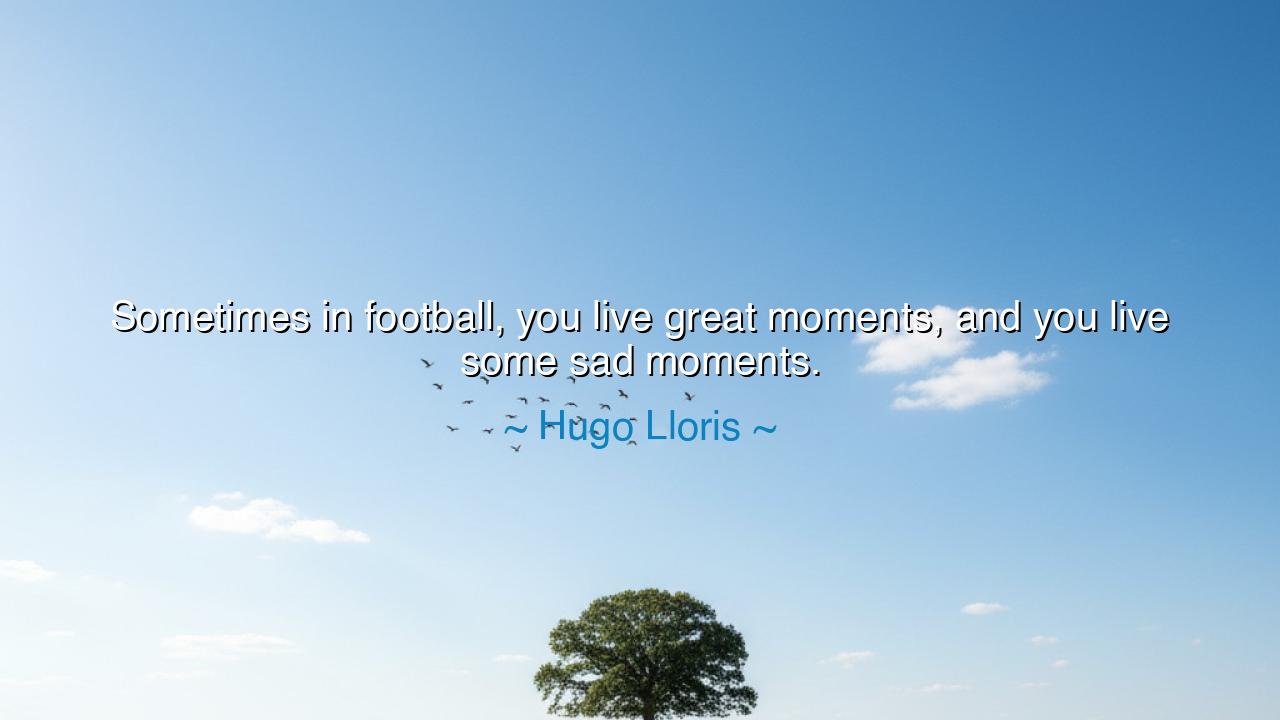
Sometimes in football, you live great moments, and you live some






When Hugo Lloris said, “Sometimes in football, you live great moments, and you live some sad moments,” he spoke with the quiet wisdom of one who has felt both triumph and despair on the field of human endeavor. Lloris, a captain and goalkeeper for both Tottenham Hotspur and the French national team, captures in these few words a universal truth: life, like sport, is a balance of glory and heartbreak, of victory and loss. In acknowledging both, he reminds us that resilience is forged in the contrast between joy and sorrow, and that character is shaped as much by defeat as by triumph.
The ancients understood this rhythm of human existence well. The Greeks spoke of eudaimonia — flourishing — as a state achieved not through uninterrupted success, but through the full engagement with life, including suffering. The Stoics, from Seneca to Epictetus, taught that adversity was a teacher, that the soul’s strength is measured by how it rises after loss. Lloris’ reflection echoes this wisdom: the sadness experienced in a lost match, the weight of failure, is not a mark of weakness, but a forge of endurance and perspective.
Football, like life, is a stage of communal struggle. One can stand at the pinnacle after a stunning save or decisive goal, feeling the ecstatic cheers of thousands, and yet only weeks later endure the sting of defeat. Lloris’ insight acknowledges that even in professional sport, no moment of joy is eternal, and no moment of despair permanent. This duality teaches humility, a lesson cherished by the ancients: to savor triumph without arrogance and to bear loss without despair.
History offers vivid illustrations of this truth. Consider Pelé, whose career was filled with unmatched victories and yet also moments of disappointment, such as defeats in World Cup tournaments before ultimate triumph. Each setback deepened his understanding of effort, team unity, and personal discipline. In football, as in life, the greatest moments are sweeter when they are measured against struggle, and the sad moments are instructive, shaping resilience, humility, and the courage to persevere.
Lloris’ words also underscore the emotional depth of leadership. As captain, he not only bears his own joy and sorrow but carries the collective emotion of his team. To witness the heights of victory and the despair of loss teaches empathy, responsibility, and courage. Leaders in all walks of life, ancient and modern, know that guiding others requires embracing both celebration and hardship, and that wisdom often comes from the latter.
This balance between great and sad moments is reflected in stories beyond sport. Abraham Lincoln, during the Civil War, experienced profound moments of sadness, from battlefield losses to personal tragedy. Yet these trials deepened his resolve and sharpened his vision, enabling him to guide a nation through its darkest hours. Like Lloris on the football pitch, Lincoln recognized that suffering is inseparable from achievement, and that endurance is the foundation of greatness.
The lesson of Lloris’ reflection is simple but profound: embrace the full spectrum of human experience. Do not cling solely to the highs nor despair solely in the lows. Each moment, joyful or sorrowful, contributes to growth, wisdom, and character. Triumph teaches strategy and confidence; loss teaches humility and perseverance. Both are essential for a life well-lived.
So, O listener, carry Lloris’ insight into your own endeavors: cherish your victories, learn from your defeats, and remain steadfast in the face of life’s inevitable fluctuations. Understand that the great moments inspire, and the sad moments instruct, and that both are necessary to cultivate courage, wisdom, and the enduring strength of the human spirit. Life, like football, is measured not just by wins and losses, but by the courage to continue playing with heart and integrity.






AAdministratorAdministrator
Welcome, honored guests. Please leave a comment, we will respond soon